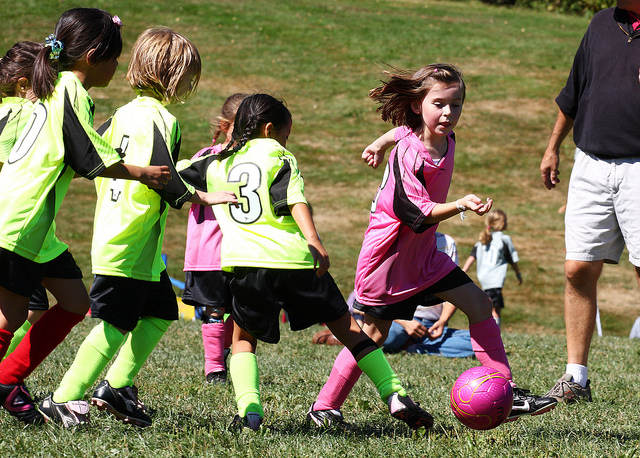
Photo by adwriter available under a Creative Commons license of www.flickr.com.
Every year, millions of young boys and girls sign up to play in local youth sports leagues across the country. From hockey to Little League Baseball, many youth dream of one day playing under the lights, in a packed stadium, in front of thousands of screaming fans. Unfortunately, for most young people, that dream will never become a reality. This leaves us to wonder, what is the real role of youth sports in society? Is it only to recognize the select few destined for athletic greatness and to weed out the rest? Or is there an inherent value for youth in playing sports, even if a career ends in the third grade? If so, what is that value, and how can we it maximize it?
There are at least five fundamental ethical questions facing youth sports.
• What is the purpose of youth sports?
Some recognize the value of youth sports for their ability to instill strong and positive character in young boys and girls. Sports can help a young person learn important life lessons like how to work hard, persevere, be a team player, set goals, and follow rules.
Others treat sports as a means of identifying great athletes at a young age. The system of youth sports begins to look like ladder, with each step representing the next competitive tier players must reach until they are at the top. They may acknowledge the important life lessons learned along the way, but ultimately sports is meant to identify those few individuals who shine and to hone their skills so that they can make it to the next level of competition. This approach may recognize little responsibility to those who don't keep climbing the ladder.
• Do youth sports do enough to protect the health and safety of youth?
Promoting a healthy, active lifestyle through fitness and exercise is an obvious benefit to playing sports at a young age. With childhood obesity rising, developing healthy habits early can be important to ensuring that children continue to make healthy choices in the future, and learn to respect their bodies and treat them well.
Safety is a concern at all levels of sports, but perhaps more so for young kids whose bodies are still maturing and developing. The effects of performance-enhancing drugs on a young person's body can be extremely dangerous and even life-threatening. Part of the moral responsibility of coaches and parents of young athletes is to make sure they understand that the choices they make with regard to their bodies can have lasting effects – both positive and negative.
Recent developments have also provided vivid reminders that every adult involved in youth sports has an obligation to protect youth from sexual abuse and from all forms of harassment and bullying. How to do this effectively is a critical ethical question.
• Is winning everything? Or does everyone deserve a trophy?
One of the debates that is constantly raging in youth sports is who should get awards. Some argue that sports for young kids should be about having fun, always encouraging one another, and staying positive. Therefore, everyone deserves a trophy because ultimately winning and losing doesn't matter.
There are others who disagree, arguing that one of the greatest lessons sports can teach a person at any age is how to deal with failure. Life is challenging, and everyone faces disappointment sooner or later. The great thing about sports is that they teach a person how to respond to disappointment in a positive way. A young athlete learns to view losing not as a failure but as a challenge to work even harder, so that next time they can be successful. Of course, the belief that only the youth who are climbing the ladder toward athletic prominence are important can label almost everyone as a failure.
• What is ethical coaching?
How a young athlete develops both within their sport and as a person has a lot to do with how he or she is coached. Youth can be very impressionable, and it is important that a coach recognize his or her role in the athletic and personal development of each individual participant.
Often a coach will tear players down in order to inspire them and make them better. However, some athletes do not respond well to this coaching strategy, and it can often destroy a young person's confidence and self-esteem. Fitting coaching to the individual is, many believe, the coach's fundamental ethical obligation.
Of course, a coach may be too relaxed in disciplining his or her players, and may fail to instill in them a proper attitude and character. It is the responsibility of a coach to recognize the needs of each individual player and to meet those needs differently. This requires a tremendous amount of compassion and understanding.
• How should parents behave?
Whether as a player, coach, official, parent, or spectator, we have all experienced those parents at youth games who just seem to take the game too seriously. Parents must realize that they play as much a role in how a young boy or girl views sports as anyone else, even if they are sitting in the stands.
Parents who constantly throw tantrums, yelling and screaming at coaches, officials, or their own children, are setting an example for their children about how to behave when things don't go their way. It is easy to appreciate parents who are passionate about their children's success, but when that passion goes too far it can be damaging to others. Finding the right balance is an ethical obligation – and challenge.
Kirk O. Hanson is the executive director of the Markkula Center for Applied Ethics. Matt Savage was a Hackworth Fellow at the Center. These materials were prepared for the Institute for Sports Law and Ethics, of which the Markkula Center is a partner organization. August 2012



